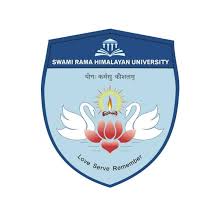General Information
Swami Rama Himalayan University (SRHU), located near Dehradun in Jolly Grant, is a well-established Private University. It was granted university status in 2013 by the Government of Uttarakhand Act. Its origins lie in the Himalayan Institute Hospital Trust (HIHT), founded by H.H. Dr. Swami Rama in 1989. The trust first established the Himalayan Institute of Medical Sciences (HIMS) in 1995, a medical college that became the cornerstone for the eventual university.
SRHU's mission reflects the holistic vision of its founder, aiming to provide quality education, healthcare (especially to underserved Himalayan communities), and research, integrating modern knowledge with ethical and spiritual values. It's known for its serene campus and its strong focus on medical and health sciences.
Key Recognitions:
Established by a State Act and recognized by the University Grants Commission (UGC).
Accredited by the National Assessment and Accreditation Council (NAAC) with an 'A' Grade.
Holds crucial approvals from professional bodies: NMC (Medical), DCI (Dental), INC (Nursing), AICTE (Engineering/Management), potentially CoA (Architecture), PCI (Pharmacy), etc., for its diverse programs.
MCI Recogination
Recognized for 100 seats when degree granted on or after march 2008. Recognized for increase of seats from 100 to 150 when degree granted on or after February, 2018. (Previously under HIHT University i.e. before June 2014) Annual renewal permission granted for 150 MBBS seats for AY 2024-25
Campus Facilities
The Campus: Tranquil Setting at Jolly Grant
SRHU's campus is known for its spacious and peaceful environment.
Location: Situated in Jolly Grant, near the Dehradun Airport, about 25 km from the main city. This offers a slightly quieter, more focused academic atmosphere compared to city-center campuses.
Campus Size & Feel: The university is spread across a large, green campus (often cited as 200+ acres), featuring modern architecture set against the backdrop of the hills. It combines academic rigor with a sense of well-being.
Infrastructure & Facilities:
Dedicated Colleges/Schools: Well-defined buildings for its various constituent colleges (Medical, Engineering, Management, Nursing, Biosciences, Yoga Science, etc.).
Central Library: A large, modern library with extensive collections, digital resources, and reading spaces. Departmental libraries supplement this.
Advanced Laboratories: State-of-the-art labs supporting programs in Medicine, Engineering, Biosciences, Yoga Science, Nursing, Paramedical, etc., including sophisticated simulation labs for medical training.
Technology Integration: Smart classrooms, campus-wide Wi-Fi, and digital learning platforms are standard.
Auditoriums & Conference Halls: Multiple venues equipped for national and international events.
Sports Complex: Comprehensive facilities for various indoor and outdoor sports, promoting student fitness and recreation.
Unique Centers: Features a dedicated Cancer Research Institute (CRI) and centers focused on Yoga Science and Holistic Health.
Amenities: Food courts, cafes, banking services (ATMs), convenience stores, guest house, and robust hospital facilities on campus.
Hospital & Medical Facilities
Leading tertiary care hospital attached to the institution
Healthcare Epicenter: Himalayan Hospital & CRI
SRHU's identity is profoundly shaped by its extensive healthcare infrastructure.
Associated Hospital: Yes, the university runs the large, well-regarded Himalayan Hospital, a multi-super specialty tertiary care teaching hospital, located prominently within the campus.
Scale & Services: Himalayan Hospital is a major healthcare provider in the region, with a substantial bed capacity (often reported as 1200+ beds). It offers:
Comprehensive care across almost all medical and surgical specialties and super-specialties.
24x7 Emergency, a Level 1 Trauma Center, and advanced Critical Care units (ICUs, NICU, etc.).
High-end Diagnostic services (including advanced Radiology like PET-CT, MRI, Pathology).
State-of-the-art Operation Theatres, including robotic surgery facilities.
Specialized centers like the Cancer Research Institute (CRI), Cardiac Centre, Neurosciences Centre, Renal Transplant Unit, etc.
Blood Bank and Component Lab.
Accreditations: Himalayan Hospital holds prestigious quality certifications like NABH (for hospital services) and NABL (for its laboratories).
Dental Wing: The university operates the Himalayan Institute of Dental Sciences (HIDS) with its own dental hospital facilities.
Educational Role: Himalayan Hospital and HIDS are the primary clinical training grounds for SRHU's MBBS, MD/MS, BDS, MDS, Nursing, Paramedical, and Pharmacy students, offering vast and diverse clinical exposure.
Fee Structure
State University Affordability
Fee Structure: Investment in Quality Private Education
As a leading private university with extensive infrastructure, SRHU's fees are significant, especially for medical programs regulated by the state.
City Details
Hostel & Mess
Campus Living: Comprehensive Hostel Facilities
SRHU provides extensive and well-managed residential facilities, often mandatory for certain courses.
Accommodation: Separate, secure hostel blocks for boys and girls are available within the large campus, offering various room types (likely AC/Non-AC options, with sharing configurations).
Amenities: Hostels are generally modern and well-maintained, providing essential furniture, 24/7 security, power backup, Wi-Fi connectivity, common rooms with recreational facilities, laundry services (paid), housekeeping, resident wardens, and excellent access to medical support via the Himalayan Hospital.
Dining: Multiple mess halls and food courts cater to the diverse student body, offering varied menus with attention to hygiene and nutrition.
Cost: Hostel and mess fees represent a significant additional annual expense. Depending on the room type (AC/Non-AC, sharing) and mess plan, expect costs to range roughly from ₹1,30,000 to ₹2,00,000 or more per year. Confirm the specific rates for different accommodation choices during admission.
Miscellaneous
Admissions & Career Launch: The SRHU Pathway
Getting Through the Door:
MBBS / BDS / MD / MS / MDS: Admission is strictly based on qualifying ranks in NEET-UG or NEET-PG/MDS. Seat allotment for State Quota, Management Quota, and NRI Quota seats is done through the Uttarakhand State NEET Counselling conducted by HNBUMU.
B.Tech: Admission is often based on JEE (Main) rank or sometimes through the university's own entrance test (check current policy).
MBA: Based on scores from national tests like CAT/MAT/XAT/CMAT or the university's test, followed by GD/PI.
Nursing / Paramedical / Yoga / Other UG/PG: Admission is typically based on merit in the qualifying examination (Class 12/Graduation) or through a university-conducted entrance test and/or interview. Check specific program requirements.
Career Kickstart (Placements): SRHU has a dedicated Career Services Department focused on student placements and internships.
Industry Interface: Leverages its reputation and location to connect with companies. Organizes campus recruitment drives, industry talks, and workshops.
Training: Emphasis on soft skills, personality development, and technical readiness for placements.
Recruiters: Attracts companies from Healthcare (major hospital chains, pharma, diagnostics - strong area), IT, Banking, Management Consulting, Education, and other sectors. Recruiters often include names like Fortis, Max Healthcare, Apollo, HCL, Wipro, TCS, ICICI Bank, Axis Bank, etc.
Salary Potential: Varies significantly by course. Health science graduates (Nursing, Paramedical) find good opportunities in the healthcare sector. B.Tech (CSE) and MBA graduates are targeted by corporate recruiters. The average package across various streams might typically fall in the ₹4 LPA to ₹6 LPA range, with higher potential for top students in sought-after fields. MBBS/MD/MS graduates follow clinical career paths.
For International & NRI Aspirants
SRHU actively caters to international students and has clear provisions for the NRI category, especially in medical/dental fields.
Collage Images Gallery
Facilities & Campus Life
Well-equipped Library
Experienced Faculty
Computer Lab
Sports Activities
Heritage Campus
Frequently Asked Questions
Why Consult With Us?
- 15+ years of experience in medical education counseling
- 5000+ students successfully guided
- 50+ partner universities worldwide
- Free initial consultation with no obligation














